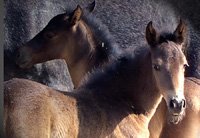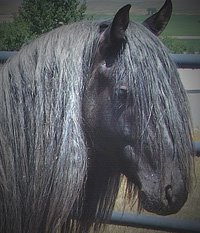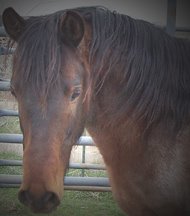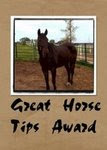 Several years ago, when I first got back into horses after a seven-year haitus, I had a problem. Almost nothing I remembered from a youth spent in stables full of domestic horses applied to my seven, wild Barbs that, according to someone I used to respect, "almost nobody can train."
Several years ago, when I first got back into horses after a seven-year haitus, I had a problem. Almost nothing I remembered from a youth spent in stables full of domestic horses applied to my seven, wild Barbs that, according to someone I used to respect, "almost nobody can train."The Arabian I bought to help ease my transition turned out to be not the well-started trail horse I'd been promised, but an extremely emotional greenie whose mind had been fried by hasty training. Instead of having a horse to ride while I figured out the Barbs, I had another problem.
So, I did what I usually do when I encounter problems: I researched. My logic was that if I could understand how my horses perceived and understood their world, I'd be able to figure out how to lead them through it. I devoured scores of websites and books on the subject. My favorite, which I re-read at least once a year, is Lucy Rees' The Horse's Mind. A second favorite, more focused on actual training techniques, is Building Your Dream Horse, by Charles Wilhelm.
All that reading went a long way toward preparing me to train. What it couldn't cure, however, was my physical response to the occasional crises that are bound to occur when you're working with ungentled or, especially, green horses. I remember several times, early in Aaruba's trail experience, when I slid gratefully from the saddle, post crisis, with numb hands and quadriceps turned to water.
Over the miles, I became increasingly adept at the kind of forced relaxation that a person can require of her body despite racing mind and pounding heart. That skill proved useful, but it wasn't enough. Horses are too sensitive to our thoughts and emotions to be tricked by good acting. So what was I to do? I figured I had two choices: Get over it, or take up knitting.
I hate knitting.
One of my best friends is a fighter. Not only is he highly trained in the martial arts, but he's lived through the kind of encounters most of us only see in movies. Recently, we got to talking about adrenaline's impact on the body and mind. "The cure for drowning in the adrenaline flood," he said, "is desensitization through graduated exposure."
I thought about that conversation today while Consolation and I were out on her fourth training ride of the season. Our trek featured the usual array of temper tantrums, teleport spooks, and coltish enthusiasm. We also had an attempted bolt.
Go ahead and say I have control issues, but I don't like being on a bolting horse. It's dangerous. It's scary. On it's surface, of course, it's not that big a deal. The horse is only running. It'll stop. All I have to do is stay aboard ...unless we encounter traffic, barbed wire, slick footing... It's the contengencies that scare me.
Anyway, today's monster was a sneezing calf. Consolation shot forward like a bar of soap in hot bathwater. I caught her in three strides, with low hands and molassas voice, and had resumed a pleasant trot before I realized that I'd hardly felt the burst of electricity across my chest. It had been there; I recognized its aftertaste. But it hadn't impacted my ability to deal with the situation.
I guess my friend was right when he said, "with additional experiences, [adrenaline's] effect diminishes, which is to say, you learn to compensate for it." Huh. All those miles astride Aaruba really have changed me as a rider. It's one of the many gifts for which I thank him.
_________________________________________________________
Want to read more posts like this one? We deliver!









9 comments:
Great job! Maybe she will mellow with time
Hang in there , it gets better. Surefire, Sunrise and Double Star, all Barbs off the same ranch as your lady, all did the same thing when startled by something. Does it happen to feel like her butt disappears out from under you????
As you know I've certainly had my fair share of these things...but you are right, the crisis situations are easily handled if a person can stay calm. In my mind adrenaline + adrenaline = disaster. Even when the worst happens and I come off, I try to just relax my body into the fall. It helps.
But Tamara, something tells me that you will mold it, shape it, and make that horse something spectacular :)
~E.G.
Tamara...how is Aaruba doing?
With your experience and the reading you do, I have full confidence that your horse will end up the way you want her to be. Repeated exposure will eventually make things ho hum....
Splash -- I'm sure she will. Seeing it already, in fact.
Jonna -- That's interesting that they all suffered disappearing-butt syndrome. Think it has to do with their extended time in the "wild?"
EG -- You inspire me to have confidence in myself. I hope you don't have to practice falling much more!
Lori -- Thanks for asking. :-) Aaruba is doing pretty well; I should post an update on him. He's almost back up to full feed and seems comfortable most of the time. Poor guy misses his job, though.
The only way to get experience is by experiencing...
I had been thinking similarly when you first announced Aaruba's recent hospitalization. I remembered you had posted his original purpose of helping you fine-tune your horsemanship before starting the Barbs.
I don't know your beliefs, but I have a feeling that God knew what horse you needed to get you to that point. I guess what I'm saying is that Aaruba is a godsend, in so many ways!
If he'd have been a calmer, seasoned trail horse, you may still not be prepared for the Barbs. It sounds like that bundle of nerves Aaruba was the best confidence-building horse you could have asked for, and that he has taught you many things. I am so glad that he has thus far survived and is improving. But maybe (maybe!) his hospitalization was a signal that you have "graduated" and a sort of a heavenly "push" towards working with the Barbs more. Yet another confidence builder, in a different form.
I hope Aaruba continues to improve. I didn't want to say this before when his health was still so uncertain, but I think it is worth mentioning, even though I think you already know it. Aaruba, although maybe not the "seasoned trail horse" you thought, was the EXACT horse you needed at the time, and he has faithfully conditioned your forced relaxation for you :-) I'd say he's prepared you well, that his job as a transition horse is complete! Now all that's left for you to do is enjoy time with your riding partner, Aaruba, and be thankful that he's done his job so well.
I really enjoy reading your posts, and I am so happy that Aaruba appears to be on the road to recovery! I wish you many more happy miles to come!
Tamara - I enjoyed this post very much. It really spoke to me about some thoughts and feelings I have gone through and are experiencing.
Thank you for sharing your work with your horses.
Love it! Great post. Those moments are so rare for me when I realize, after the fact, that I've handled a situation well and not felt the hot surge of fear.
The last time was when a startled fawn bolted out of the underbrush almost under our noses with a chuff, and Maria, being only four, was terrified. She moved forward so fast I found myself lying against her hindquarters. Somehow I righted myself and stopped her all within a few strides. Still don't know how I did it.
I didn't realize that I should have been pleased with our performance until we got back to the barn.
It's good for you to write things like this: we need to pat ourselves on the back more when things go right. I like how your friend characterizes exposure to fearful situations--desensitization works on humans, too!
I'm so glad Aaruba is doing better! I was getting worried for him!
Post a Comment